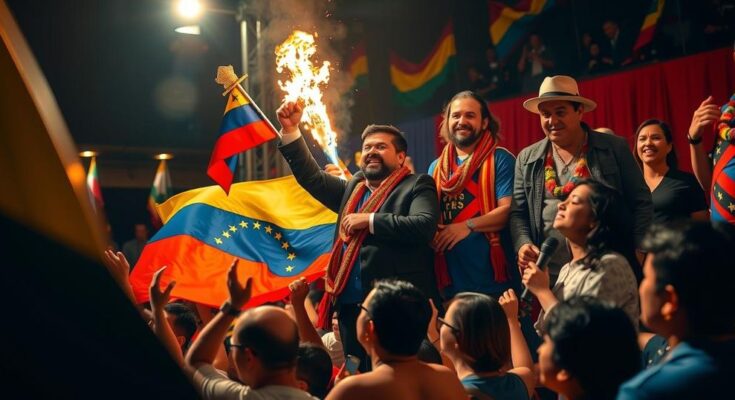Venezuela congratulates Uruguay’s newly elected president Yamandú Orsi of the Frente Amplio, celebrating this as a victory over the neoliberal right. The election ends a period of strained relations with Uruguay, and Orsi’s leadership is expected to foster improved ties between the two nations, invigorating a more cooperative future.
In light of the recent electoral victory of the leftist coalition known as the Frente Amplio in Uruguay, Venezuela has extended its congratulations to the newly elected president, Yamandú Orsi, and his vice-presidential running mate, Carolina Cosse. The Venezuelan Ministry of Foreign Affairs celebrated this outcome as a significant triumph over what they termed the “neoliberal right.” Such positive sentiments could foster a renewed cooperative relationship between Uruguay and Venezuela, especially following a period of tension during the administration of outgoing president, Luis Lacalle Pou, who openly criticized the Maduro government.
President Orsi, who previously served as a teacher and mayor, achieved a narrow victory over Álvaro Delgado of the right-wing National Party. The election results revealed that the Frente Amplio garnered 1,196,798 votes as opposed to Delgado’s 1,101,296, amidst a voter turnout of 89%. This election marks a significant return of the left to power in Uruguay after a five-year hiatus, with Orsi expected to embody the progressive governance style that characterized his coalition’s previous leadership.
While Orsi has faced scrutiny for his past critical remarks regarding Venezuela’s political situation, Cosse has previously asserted the right of nations like Venezuela to self-determination. In her 2018 remarks, she emphasized the legitimacy of the elected leadership in Venezuela, stating, “I do not consider Cuba and Venezuela to be dictatorships. I believe that each nation has the right to self-determination.” In his victory speech, Orsi pledged to promote dialogue and a more inclusive society, highlighting his commitment to not leaving anyone behind economically, socially, or politically.
The context of this article pertains to the recent electoral success of the Frente Amplio party in Uruguay, symbolizing a resurgence of leftist governance after a five-year period of a right-wing administration. The coalition previously held the presidency for 15 years before losing power. Venezuela’s congratulatory response to Orsi’s victory reflects a desire to mend diplomatic ties after experiencing strained relations during Lacalle Pou’s presidency, who was known for his public opposition to the Maduro administration. This political shift in Uruguay may influence future interactions between the two nations, particularly under a leadership that seeks collaborative engagement despite expressing differing views on Venezuelan governance.
The electoral win by the Frente Amplio in Uruguay signifies not only a shift in the political landscape of the country but also opens the door for improved relations with Venezuela. President Yamandú Orsi’s commitment to cooperation and dialogue could mark a new chapter in bilateral engagement, contrasting sharply with the previous administration’s antagonistic stance. The implications of this victory resonate beyond national borders, offering a beacon of hope for leftist movements in the region.
Original Source: venezuelanalysis.com




